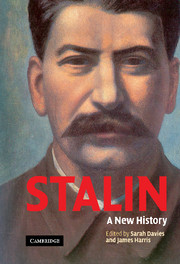Book contents
- Frontmatter
- Contents
- Notes on contributors
- Preface
- A note on transliteration
- Glossary
- 1 Joseph Stalin: power and ideas
- 2 Stalin as Georgian: the formative years
- 3 Stalin as Commissar for Nationality Affairs, 1918–1922
- 4 Stalin as General Secretary: the appointments process and the nature of Stalin's power
- 5 Stalin as Prime Minister: power and the Politburo
- 6 Stalin as dictator: the personalisation of power
- 7 Stalin as economic policy-maker: Soviet agriculture, 1931–1936
- 8 Stalin as foreign policy-maker: avoiding war, 1927–1953
- 9 Stalin as Marxist: the Western roots of Stalin's russification of Marxism
- 10 Stalin as Bolshevik romantic: ideology and mobilisation, 1917–1939
- 11 Stalin as patron of cinema: creating Soviet mass culture, 1932–1936
- 12 Stalin as producer: the Moscow show trials and the construction of mortal threats
- 13 Stalin as symbol: a case study of the personality cult and its construction
- 14 Stalin as the coryphaeus of science: ideology and knowledge in the post-war years
- Index
9 - Stalin as Marxist: the Western roots of Stalin's russification of Marxism
Published online by Cambridge University Press: 24 November 2009
- Frontmatter
- Contents
- Notes on contributors
- Preface
- A note on transliteration
- Glossary
- 1 Joseph Stalin: power and ideas
- 2 Stalin as Georgian: the formative years
- 3 Stalin as Commissar for Nationality Affairs, 1918–1922
- 4 Stalin as General Secretary: the appointments process and the nature of Stalin's power
- 5 Stalin as Prime Minister: power and the Politburo
- 6 Stalin as dictator: the personalisation of power
- 7 Stalin as economic policy-maker: Soviet agriculture, 1931–1936
- 8 Stalin as foreign policy-maker: avoiding war, 1927–1953
- 9 Stalin as Marxist: the Western roots of Stalin's russification of Marxism
- 10 Stalin as Bolshevik romantic: ideology and mobilisation, 1917–1939
- 11 Stalin as patron of cinema: creating Soviet mass culture, 1932–1936
- 12 Stalin as producer: the Moscow show trials and the construction of mortal threats
- 13 Stalin as symbol: a case study of the personality cult and its construction
- 14 Stalin as the coryphaeus of science: ideology and knowledge in the post-war years
- Index
Summary
Introduction
There exists an extensive scholarly literature highlighting the impact of Russia's national traditions on the Stalinist state and society. The present article focuses on ideology, understood as a body of interconnected ideas providing a comprehensive view of the actual and desirable state of society. As a rule, scholarly literature is more interested in the Stalinist transformations of the real world than in the dictator's dogmatic pronouncements. Nevertheless, there exists a rough consensus that Stalin substantially russified Marxist ideology. Assuming that the Russian tradition powerfully influenced Stalinist realities, this is what we would expect. It goes against common sense for state ideology to have remained unaffected when state policies and everyday social realities have not. Not only in his day-to-day practice of power, but in his ideology, too, Stalin adapted himself to the authoritarianism, bureaucratic etatism, and patriotism that were important elements in the Russian political tradition.
However, on a closer look the consensus on Stalin's russification of Marxism is rather shallow. Some authors hold that the dictator did indeed impose a drastic shake-up of Marxist ideology. But others disagree, arguing that he did not change all that much in the existing ideology itself, and that to look in that direction would be to miss the point.
- Type
- Chapter
- Information
- StalinA New History, pp. 159 - 180Publisher: Cambridge University PressPrint publication year: 2005
- 3
- Cited by



